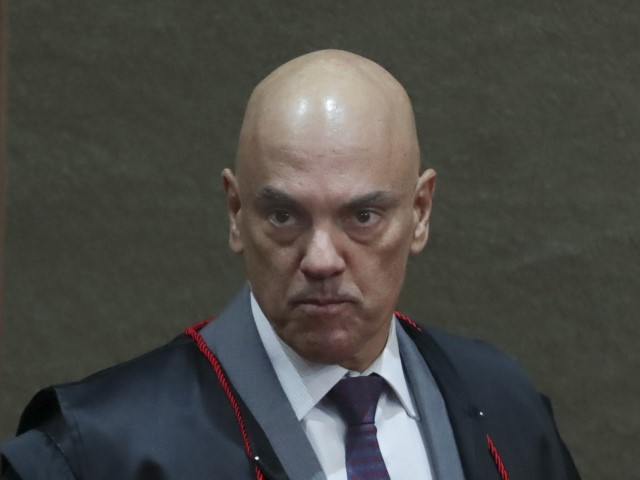The Brazilian Public Prosecutor’s Office (MPF) filed a public civil action on Tuesday that seeks to strip conservative news network Jovem Pan of its three radio broadcasting licenses.
MPF accuses the network of allegedly having spread a “disinformation campaign,” broadcasting content that “attacks democracy,” and advocating for military intervention during the 2022 presidential election through three of the shows produced by the network.
The action would also require some Jovem Pan networks to air government-created content.
The list of allegedly “anti-democratic” content was broadcast between January 1, 2022, and January 8, 2023, the day when thousands of protesters stormed the premises of the nation’s Congress, Supreme Federal Tribunal (STF), and the Planalto presidential palace.
In addition to having its radio broadcast licenses revoked, the Public Prosecutor’s Office requested that Jovem Pan be ordered to pay 13.4 million Brazilian reais (about $2.75 million) as compensation for “collective moral damages.” The amount – which according to the MPF’s action, represents ten percent of the network’s assets – will “repair the damage caused” to Brazilian society by the broadcast content .
Jovem Pan, established in 1944, is one of Brazil’s largest radio networks and the country’s only major conservative news network, with 115 affiliated radio stations spread across Brazilian territory, a pay-TV channel, and a YouTube channel. In 2014, the Brazilian Association of Radio and Television Broadcasters (ABERT) listed Jovem Pan FM as one of the largest stations in the world.
While the action seeks to strip Jovem Pan of its three radio broadcast licenses, it does not involve the removal of the network’s local TV channel license.
The MPF is also requesting that Brazilian federal courts force Jovem Pan to broadcast messages with official content and information provided by the Brazilian government about the reliability of the country’s electoral process. The messages, MPF explained in a statement on its civil action, would have to be between two and three minutes long and aired at least 15 times a day between 6 a.m. and 9 p.m. for a period of four months. The action does not specify if the messages would have to air on radio or television, but MPF states that failure to comply would result in a daily fine of roughly $20,500.
Jovem Pan stated to other media outlets that its defense will be “exclusively manifested” in the case file.
“The Jovem Pan group has reaffirmed daily, over 80 years, its commitment to Brazilian society and democracy,” they stated.
Jovem Pan’s lawyers also released a statement on Wednesday describing the action as an attempt to hijack the news network while asserting that MPF did not hear testimonies from employees of the network during the investigation as promised.
“As lawyers for Jovem Pan, we want to register our bafflement at the Public Civil Action filed yesterday by the Federal Public Ministry,” the statement read. “It is clear that the representative of the Public Prosecutor’s Office has a duty to defend what he understands to be right, but there is also an obligation, as a public servant, to act with the loyalty that citizens and companies deserve.”
“In meetings to deal with the Public Civil Inquiry that investigated the facts in question, the company made itself available to clarify absolutely everything and to present whatever was requested,” it continued. “The MPF representative, more than once, spoke of the need to hear employees, former employees, directors, with the purpose of promoting a broad and detailed investigation. However, strangely enough, none of this happened.”
“What can be seen from the request for a preliminary injunction is a real attempt to intervene in Jovem Pan, without any further investigation in the inquisitorial or judicial sphere, something unacceptable in the democratic rule of law,” the attorneys asserted. “The company is sure that, in a democratic government, constitutional rules should guide all relations. It is public and notorious that Jovem Pan has already taken numerous measures that demonstrate the existence of business activities within constitutional limits and consistent with the permits it holds.”
The announcement of the public civil action against the conservative news network immediately prompted the Brazilian Association of Radio and Television Broadcasters (ABERT) to issue a press release on Tuesday in which they expressed serious concern about the action, describing it as an “extreme and serious measure without precedent in our Democratic State of Law.”
“Broadcasters’ programming freedom is essential for the free exercise of journalism and the existence of pluralism of opinion, which must always be preserved,” the press note read. “ABERT will be vigilant in the defense of freedom of expression and of the press and will follow the developments of this action.”
Brazilian lawyer André Marsiglia, who specializes in freedom of expression, told Jovem Pan on Thursday that MPF’s actions against the network are an “unprecedented request in democratic times.”
“A request that stems from a very dangerous premise. The Public Ministry and the Judiciary think that they can be the people to tell us which vehicles can or cannot remain in the public debate,” Marsiglia said.
He continued:
That premise is absolutely authoritarian. A request unprecedented in democratic times in Brazil and typical of authoritarian regimes. Even if this request is not accepted, it by itself already constrains the freedom of expression in the country and also threatens the other broadcasters.
“Censorship doesn’t just happen with a pen stroke so that you are not allowed to speak, but also in an attempt to strangle,” he continued. “The essence of this…is ‘If I can’t shut you up, I can at least discourage you,’ or make it unprofitable for you to continue to speak out. It’s what we call collateral censorship.”
Brazilian Senator Sergio Moro, Bolsonaro’s former Minister of Justice, said on his Twitter account on Tuesday that the action against Jovem Pan represents an “authoritarian risk.”
“The action of some MPF prosecutors in which they request the judicial cancellation of Jovem Pan’s broadcasting licenses violates the freedom of the press and represents an authoritarian risk,” Moro said. “Any abuses or excesses would be resolved by fines or compensation.”
A ação de alguns procuradores do MPF na qual pedem o cancelamento judicial de outorgas de radiodifusão da Jovem Pan viola a liberdade de imprensa e representa um risco autoritário. Eventuais abusos ou excessos devem ser resolvidos por multa ou indenização.
— Sergio Moro (@SF_Moro) June 27, 2023
The public civil action against Jovem Pan occurs as President Jair Bolsonaro faces a trial at Brazil’s Superior Electoral Tribunal (TSE) that could end with him banned from running for public office until 2030. Bolsonaro faces charges of spreading “misinformation” about Brazil’s electoral system and its ballot boxes during a meeting with ambassadors in July 2022.
After leftist Justice Minister Flavio Dino stated in January that the regulation of social media was a high priority of his office, the Brazilian government introduced an anti-“fake news” bill in Congress aimed at censoring alleged disinformation through the regulation of social media platforms and punishing the spread of online content deemed “false.”
After a series of delays and debates, lawmakers are expected to vote on the bill sometime in the second half of this year.
Brazil has also experienced extensive acts of censorship spearheaded by Alexandre de Moraes, the self-styled “anti-fake news” crusader who leads both the nation’s Federal Supreme Court (STF, the highest court in Brazil) and Superior Electoral Tribunal (TSE).

President of the Supreme Electoral Court, Minister Alexandre de Moraes, arrives to preside over the trial of former President Jair Bolsonaro at the Supreme Court in Brasilia, Brazil, Thursday, June 29, 2023. Judges continue evaluating the case which claims Bolsonaro abused his power by using government communication channels to promote his campaign and cast unfounded doubts on the country’s electronic voting system. If proven, it could make Bolsonaro ineligible for eight years. (Gustavo Moreno/AP)
De Moraes has authorized actions as part of his fight against “fake news,” most dramatically a series of police raids against lawmakers, comedians, content creators, and regular citizens supportive of former President Jair Bolsonaro.
Since 2021, and under de Moraes’s orders, the Brazilian top court has maintained an active inquiry to investigate alleged “anti-democratic digital militias” that spread “fake news.” The inquiry has been renewed seven times, with the latest 90-day renewal taking place in May.
The inquiry was recently used to authorize “Operation Venire,” a broad probe into allegations that Bolsonaro falsified vaccination documents to travel to the United States that saw Bolsonaro’s house raided and the arrest of top aide Mauro Cid.

Former Brazilian President Jair Bolsonaro speaks to the press outside his home before getting into a car after Federal Police agents carried out a search and seizure warrant in Brasilia, Brazil, Wednesday, May 3, 2023. The Federal Police press office gave a statement saying officers were carrying out searches and arrests related to the [alleged] introduction of fraudulent data related to the COVID-19 vaccine into the nation’s health system. (Eraldo Peres/AP)
Christian K. Caruzo is a Venezuelan writer and documents life under socialism. You can follow him on Twitter here.


